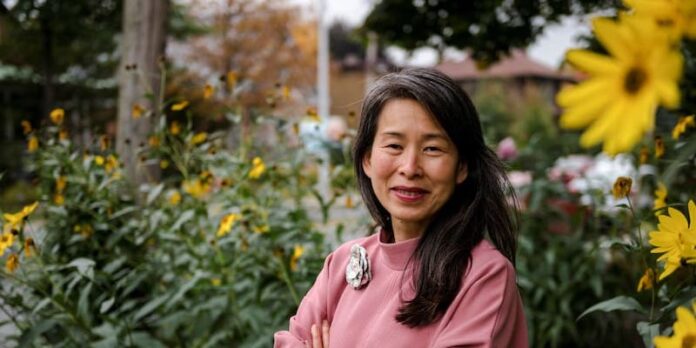Vietnamese-Canadian author Kim Thuy poses for a portrait at her home in Longueuil, Quebec. — AFP pic
HONG KONG, Oct 31 — As conflict pushes millions across the globe from Afghanistan to Syria to flee their homes, award-winning author Kim Thuy says ‘refugee literature’ has the power to restore lost identities and reveal the potential of these “superhumans”.
Thuy — who escaped Saigon as a 10-year-old in the aftermath of the Vietnam War — predicted that the world’s attention would soon drift from crises such as Afghanistan, leaving those who fled the Taliban voiceless and battling to prove themselves in their new lives.
The novelist — who was among Vietnam’s thousands of “boat people” and spent months in a refugee camp in Malaysia in the 1970s — has spent her writing career gathering threads of stories of Vietnamese forced to flee, trying to illuminate the lives of communities she says are overlooked.
“When you are on the outside perhaps you cannot see why we should rescue these people,” she told AFP, saying she saw parallels between the desperate families that thronged Kabul’s airport following the withdrawal of US troops and those that escaped the country of her birth more than 40 years earlier.
“But if they have survived the sea, if they have walked hundreds of kilometres or if they have climbed walls and they still survive, then it’s because they have become superhumans.
“So when you plant them anywhere they will grow back, maybe stronger than the average,” said Thuy, who has just released a new book, Em, in English translation.
Losing your past and future
The UN has warned that up to half a million people could flee Afghanistan by the end of the year, on top of the 2.5 million Afghans already registered as refugees across the world.
Neighbouring countries have been asked to keep their borders open and the UN High Commissioner for Refugees (UNHCR) has urged the EU to take in more than 40,000 over five years.
But it’s not clear what their future holds.
The arrival of more than a million migrants on Europe’s shores in 2015, many of them Syrian asylum-seekers fleeing a brutal civil war, sparked political chaos as nations argued over who should take responsibility.
Nobel laureate Abdulrazak Gurnah, who has heavily criticised the European and British responses, is one of a growing number of writers telling the refugee story.
Earlier this month Gurnah landed literature’s top award for his decades-spanning body of work rooted in colonialism and immigration.
Thuy, who has an honourary doctorate from Montreal’s Concordia University for giving a voice to the refugee experience, believes passionately that new arrivals have the capacity to enrich a country — but she concedes that taking them in is a “total bet”.
“When you’re in a refugee camp you’ve lost your past — you don’t have any identity anymore,” said the 53-year-old.
“And you don’t have any future because you don’t even know when you’re going to eat next, let alone where you’ll be next.”
Her own story is testament to how that gamble can pay off.
Thuy and her family arrived in Malaysia penniless, on board a wooden boat that disintegrated moments after landing on the shoreline, and lived in a makeshift hut so small they were forced to sleep “like we were in a game of Tetris”.
Three decades later she returned to the South-east Asian country as part of a delegation from Canada — the country that took her in — having scooped a prestigious national literary award for her debut novel Ru.
In between, she earned a degree in translation — funding her studies through work as a seamstress — and qualified as a lawyer.
In 2018, Thuy was among four authors shortlisted for the alternative Nobel Literature Prize, an award created after a scandal at the Swedish Academy which normally gives the prestigious award.
Restoring their humanity
Thuy, who is married to a Quebec-born lawyer and has two sons, now writes to illuminate the pasts of others that have been forgotten.
Her latest book Em, originally written in French, the language of her adopted home Quebec, weaves together snippets of Vietnamese lives before and after the war and gently lays out their connection with the diaspora identity.
Based on real-life stories but using fictional characters, the novel snakes between the rubber plantations of the French colonial era, Saigon at the end of the war when thousands of children were evacuated during “Operation Babylift” and the new homelands of those who escaped.
The ingenuity of the Vietnamese diaspora is also in focus.
One story reveals how they came to dominate the nail industry following a manicure class organised by Tippi Hedren — the actress in Alfred Hitchcock’s The Birds — during a visit to a camp in 1975.
Those 20 refugees in the class settled in California, passed their skills to a few dozen others, and in only a few years the community had opened salons all over the world.
For Thuy, delving into refugee’s complex histories is an essential part of restoring their humanity.
“I don’t need readers to understand, I just need them to feel something,” she says. — AFP


